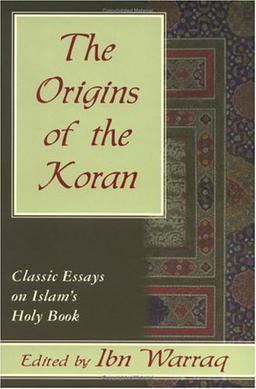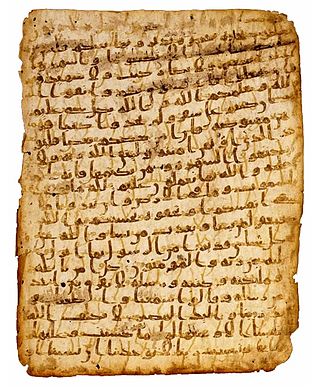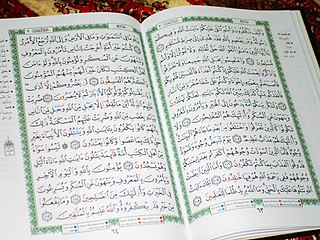
The Quran, also romanized Qur'an or Koran, is the central religious text of Islam, believed by Muslims to be a revelation from God. It is organized in 114 chapters, which consist of verses. In addition to its religious significance, it is widely regarded as the finest work in Arabic literature, and has significantly influenced the Arabic language.
Ijmāʿ is an Arabic term referring to the consensus or agreement of the Islamic community on a point of Islamic law. Sunni Muslims regard ijmā' as one of the secondary sources of Sharia law, after the Qur'an, and the Sunnah. Exactly what group should represent the Muslim community in reaching the consensus is not agreed on by the various schools of Islamic jurisprudence. Some believe it should be the Sahaba only; others the consensus of the Salaf ; or the consensus of Islamic lawyers, the jurists and scholars of the Muslim world, i.e. scholarly consensus; or the consensus of all the Muslim world, both scholars and lay people. The opposite of ijma is called ikhtilaf.

Ibn Warraq is the pen name of an anonymous author critical of Islam. He is the founder of the Institute for the Secularisation of Islamic Society and used to be a senior research fellow at the Center for Inquiry, focusing on Quranic criticism. Warraq is the vice-president of the World Encounter Institute.
John Edward Wansbrough was an American historian who taught at the University of London's School of Oriental and African Studies (SOAS), where he was vice chancellor from 1985 to 1992.
The mysterious letters are combinations of between one and five Arabic letters figuring at the beginning of 29 out of the 114 chapters (surahs) of the Quran just after the Bismillāh Islamic phrase. The letters are also known as fawātiḥ (فَوَاتِح) or "openers" as they form the opening verse of their respective surahs.
The historiography of early Islam is the scholarly literature on the early history of Islam during the 7th century, from Muhammad's first purported revelations in 610 until the disintegration of the Rashidun Caliphate in 661, and arguably throughout the 8th century and the duration of the Umayyad Caliphate, terminating in the incipient Islamic Golden Age around the beginning of the 9th century.

The Samarkand Kufic Quran is an 8th or 9th century manuscript Quran written in the territory of modern Iraq in the Kufic script. Today it is kept in the Hast Imam library, in Tashkent, Uzbekistan.

In Islam, ’i‘jāz or inimitability of the Qur’ān is the doctrine which holds that the Qur’ān has a miraculous quality, both in content and in form, that no human speech can match. According to this doctrine the Qur'an is a miracle and its inimitability is the proof granted to Muhammad in authentication of his prophetic status. It serves the dual purpose of proving the authenticity of its divineness as being a source from the creator; and proving the genuineness of Muhammad's prophethood to whom it was revealed as he was one bringing the message.
Gerd Rüdiger Puin is a German scholar of Oriental studies, specializing in Quranic palaeography, Arabic calligraphy and orthography. He was a lecturer of Arabic language and literature at Saarland University in Saarbrücken, Germany. In regards to his approach of historical research, Puin is considered a representative of the "Saarbrücken School", which is part of the Revisionist School of Islamic Studies.

The Origins of The Koran: Classic Essays on Islam’s Holy Book is a 1998 book edited by Ibn Warraq. It contains a collection of 13 critical studies of the Qur'an written over the past two centuries by historians and scholars of the Middle East: Ibn Warraq, Theodor Nöldeke, Leone Caetani, Alphonse Mingana, Arthur Jeffery, David Samuel Margoliouth, Abraham Geiger, William St. Clair Tisdall, Charles Cutler Torrey and Andrew Rippin. Most of these authors wrote their essays on the Qur'an before World War II (1939–1945).
Arthur Jeffery was a Protestant Australian professor of Semitic languages from 1921 at the School of Oriental Studies in Cairo, and from 1938 until his death jointly at Columbia University and Union Theological Seminary in New York City. He is the author of extensive historical studies of Middle Eastern manuscripts. His important works include Materials for the History of the Text of the Qur'an: The Old Codices, which catalogs all surviving documented variants of the orthodox Quran text; and The Foreign Vocabulary of the Qur'an, which traces the origins of 318 foreign (non-Arabic) words found in the Qur'an.
History of the Quran is the timeline and origin of the written compilations or manuscripts of the holy book of Islam, based on historical findings. It spans several centuries, and forms an important major part of the early history of Islam.
In Islam, Qirāʼah, are different linguistic, lexical, phonetic, morphological and syntactical forms permitted with reciting the holy book of Islam, the Quran. Differences between Qiraʼat are slight and include varying rules regarding the prolongation, intonation, and pronunciation of words, but also differences in stops, vowels, consonants, and less frequently entire words. Qiraʼat also refers to the branch of Islamic studies that deals with these modes of recitation.

The Syro-Aramaic Reading of the Koran: A Contribution to the Decoding of the Language of the Koran is an English-language edition (2007) of Die syro-aramäische Lesart des Koran: Ein Beitrag zur Entschlüsselung der Koransprache (2000) by Christoph Luxenberg.
Criticism of the Quran is an interdisciplinary field of study concerning the factual accuracy of the claims and the moral tenability of the commands made in the Quran, the holy book of Islam. The Quran is viewed to be the scriptural foundation of Islam and is believed by Muslims to have been sent down by God (Allah) and revealed to Muhammad by the archangel Jabreel, also spelt Jibraeel (Gabriel). It has been subject to criticism both in the sense of being studied by mostly secular Western scholars and in being found fault with.

The historicity of Muhammad refers to the study of Muhammad as a historical figure and critical examination of sources upon which traditional accounts are based.

The Sanaa palimpsest or Sanaa Quran is one of the oldest Quranic manuscripts in existence. Part of a sizable cache of Quranic and non-Quranic fragments discovered in Yemen during a 1972 restoration of the Great Mosque of Sanaa, the manuscript was identified as a palimpsest Quran in 1981 as it is written on parchment and comprises two layers of text. The upper text largely conforms to the standard 'Uthmanic' Quran in text and in the standard order of chapters, whereas the lower text contains many variations from the standard text, and the sequence of its chapters corresponds to no known Quranic order. A partial reconstruction of the lower text was published in 2012, and a reconstruction of the legible portions of both lower and upper texts of the 38 folios in the Sana'a House of Manuscripts was published in 2017 utilising post-processed digital images of the lower text. A radiocarbon analysis has dated the parchment of one of the detached leaves sold at auction, and hence its lower text, to between 578 CE and 669 CE with a 95% accuracy.

In Muslim tradition the Quran is the final revelation from God, Islam's divine text, delivered to the Islamic prophet Muhammad through the angel Jibril (Gabriel). Muhammad's revelations were said to have been recorded orally and in writing, through Muhammad and his followers up until his death in 632 CE. These revelations were then compiled by first caliph Abu Bakr and codified during the reign of the third caliph Uthman so that the standard codex edition of the Quran or Muṣḥaf was completed around 650 CE, according to Muslim scholars. This has been critiqued by some western scholarship, suggesting the Quran was canonized at a later date, based on the dating of classical Islamic narratives, i.e. hadiths, which were written 150–200 years after the death of Muhammad, and partly because of the textual variations present in the Sana'a manuscript. With the discovery of earlier manuscripts which conform to the Uthmanic standard however, the revisionist view has fallen out of favor and been described as "untenable", with western scholarship generally supporting the classical Muslim view.
The Revisionist school of Islamic studies, is a movement in Islamic studies that questions traditional Muslim narratives of Islam's origins.

Historical reliability of the Quran concerns the question of the historicity of the described or claimed events in the Quran.










